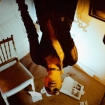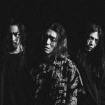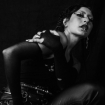Kristina Esfandiari has emerged over the last few years as one of the more enrapturing voices in modern music — have a listen to her spectral howls on King Woman's recent Created in the Image of Suffering, or her hypnotic croons on her solo work under the name Miserable — but she wasn't always so confident in her abilities as a singer and performer. Growing up as an admitted "shy kid," Esfandiari recalls that, early on, she'd often vomit before shows and her body would shake onstage. "I sounded like a goat because I was so nervous," she says.
An early King Woman performance, prior to the release of their celebrated 2014 four-song debut, Doubt, changed things. "It was this moldy-ass room with no windows," Esfandiari recalls of the Witch House, a venue in Santa Cruz, California, not far from where her band formed in San Francisco. "We had a fog machine, and it was not a good idea to use a fog machine in that room. But the music started going and I just remember having this transcendent experience where I left my body, and when I came back I was just screaming. Something had changed in my brain and in my heart. I had never done that, ever, in my whole life. Because I was raised to think that if you're screaming, you have demons and it's evil."
Esfandiari does, in fact, have plenty of demons, but in this case embracing them proved more an act of catharsis than wickedness. By this point in time, anyone who is at all familiar with King Woman's mesmeric, drone-y and doomy sound, not to mention Esfandiari's elastic and ethereal voice, is also at least somewhat aware of the more well-tread points of the singer's backstory — in particular her upbringing in a "charismatic Christian" church, which she says could be a manipulative and sometimes abusive environment.
For Esfandiari, her ability to confront those demons — as she does on King Woman songs like "Wrong" ("Fill this place with fear/There's no great spirit here") or Created in the Image of Suffering's "Manna" ("Am I created in the image of my Father God?") — was sparked at least in part by another transcendent experience. "The first time I did psychedelics I had this mind-blowing moment where I was like, 'Oh, my god — my life is a lie. And I don't know myself at all!'" she recalls. "It was so exhilarating and so terrifying. Like, how could I be so unaware of everything that was going on inside of me? Before that, I was totally shut off to it."
Since opening herself and her music up to it, she has received both positive and sometimes surprisingly negative responses from listeners. "I've gotten emails from people all over the world going, 'Thank you for talking about this. Nobody talks about this shit,'" Esfandiari says, adding that, at the same time, "I'd get random Christians trying to pray for me through, like, Facebook Messenger or whatever. So I also had this moment of, 'Oh shit, what have I done?'"
Which is not to say that religion and spirituality are the sole subjects tackled on Created in the Image of Suffering. "Utopia," for one, chronicles Esfandiari's experiences partaking in an ayahuasca ceremony, while the album's stunning centerpiece, a haunting ballad titled "Hierophant," came, she says, out of "desperation. And really brutal unrequited love." Furthermore, as a veteran of the indie-shoegaze scene — Esfandiari began her singing career as a member of the San Francisco band Whirr — she doesn't see King Woman, which also includes guitarist Colin Gallagher, drummer Joey Raygoza and bassist Peter Arensdorf, as being particularly bound to the heavy music scene they now find themselves so embraced by.
"It's not metal," she says definitively. "But I think people get uncomfortable when they can't label you. It's expressive, emotional music. And anybody can relate to that, you know? I want to have a positive message and empower other people through the way I live and the way I perform."
As if to drive her point home, Esfandiari returns to that transformative performance at the Witch House. "That scream really empowered me," she says. "I felt like I could fucking breathe for the first time. After that show I felt like a different person. Like, 'I'm King Woman.' And no one could fuck with me."








